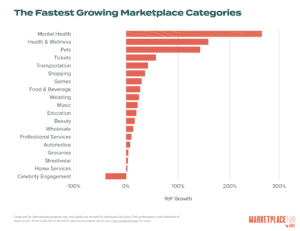The importance of emotional and mental health in early childhood education cannot be overstated.
As we navigate the aftermath of a global pandemic and prepare for a future shaped by technological advances, including artificial intelligence (AI), it is essential to prioritize the social-emotional well-being of our youngest learners. By doing so, we can lay the foundation for a generation of adults who are equipped to thrive in an ever-changing world.
Mental Health Services Are in High Demand
According to the 2023 Marketplace 100 report, compiled by venture capital firm Andreessen Horowitz (a16z), mental health has emerged as one of the fastest-growing categories in the consumer marketplace.
The report highlights that the psychological impact of quarantine has led to increased demand for mental health services, with 30.7% of U.S. adults showing symptoms of anxiety or depressive disorder in December 2021, compared to just 10.8% in 2019.
This data underscores the need for early intervention and support for mental health, starting in childhood.

Our Societal Responsibly: Support Youth
As parents and educators of young children, we have a unique opportunity to foster emotional and mental health in the classroom.
By integrating social-emotional learning (SEL) programs into early childhood education, we can promote the development of essential skills such as self-awareness, empathy, resilience, and effective communication. These skills not only contribute to a child’s overall well-being but also prepare them for the challenges and opportunities of adulthood.
Science Supports SEL
SEL programs in early childhood education have been shown to have long-lasting positive effects.
A 2015 study published in the American Journal of Public Health found that children who participated in SEL programs in kindergarten had better outcomes in areas such as education, employment, and mental health up to 25 years later!
By supporting emotional and mental health in early childhood, we can help children build a strong foundation for their future.
Recovering from Setbacks
The pandemic has brought unprecedented challenges to children and families, disrupting routines, social interactions, and learning experiences in-school and out. As we recover and rebuild, it is crucial to prioritize SEL in our educational settings.
SEL programs provide children with the tools to navigate uncertainty, cope with stress, and build positive relationships. These skills are invaluable as we enter a world where many jobs and careers will be impacted by AI and other technological advances.
The Holistic Impact of SEL
In addition to the benefits for individual children, SEL programs contribute to a positive and inclusive classroom environment. By fostering empathy and understanding, SEL helps reduce instances of bullying and promotes a sense of belonging for all students. This inclusive environment is essential for the healthy development of children from diverse backgrounds and experiences.
Using Today’s Data for a Better Tomorrow
As we examine the data and look to the future, it is clear that the demand for mental health services will continue to grow.
By investing in SEL programs for early education, such as Minibop’s school programming, we can address this demand proactively, setting children on a path to emotional and mental well-being. Moreover, we can prepare them for a world where adaptability, collaboration, and emotional intelligence will be key to success.





